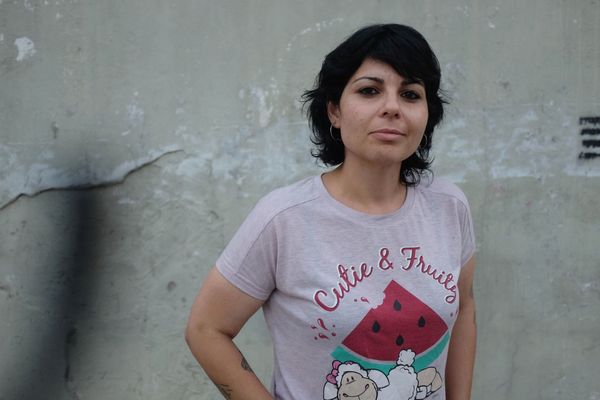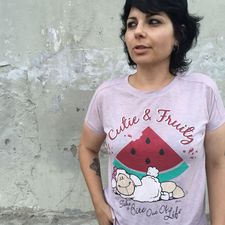 |
| "I think the job of art is to raise questions and to put up a mirror for society" - Maysaloun Hamoud Photo: Anne Maniglier |
It might seem like a modest subject for a film - three women sharing a flat, developing a strong friendship and helping each other to deal with life's challenges - but Maysaloun Hamoud's In Between has had a phenomenal impact on Palestinian society. Such has been the anger inspired by its frank portrayal of women's lives that a fatwa has been issued against the director. Maysaloun admits that it frightened her, but as far as the film was concerned, it gave it a massive publicity food. Now this thoughtful, intelligent drama is pulling in crowds not only at home but also overseas. It's about to open in UK cinemas. Maysaloun and I spoke on the phone about the impact is has had.
It has been very differently received in different place, she says, but "the Palestinian society, which is my society, has a kind of shock, because they never got to deal with the voice that I put in my movie, and the movie obligated them to deal with topics that they never wanted to talk about. Basically, the patriarchy said that the movie is forbidden and the movie is insulting, but it was just a reaction from men... At the same time it opens a really true dialogue in the Palestinian society, which is a historical event that happened through the movie release."
 |
| "When you put all the topics up front, people have to talk" - Maysaloun Hamoud Photo: Anne Maniglier |
The film is set in Tel Aviv and deals with Palestinians living in Israel, so it has also made its mark on Jewish audiences.
"The Jewish society was fascinated but at the same time had a shock too because the movie breaks all the stereotypes that they use to see us as Palestinians," Maysaloun explains. "We live around them but we are invisible and they never think of us as equal people like, you know, human beings. When they see the characters and see that they are so beautiful and sharp and clever they just have to ask themselves how they didn't see those things till now."
Why is it so challenging for traditionalists?
"They don't want to talk about sex or violence. They don't want to talk about the taboos," Maysaloun says. But she's not talking about anything a Western audience would consider gratuitous, and the main act of violence in the film is committed by a character who is a staunch advocate of traditional values; the film is addressing social problems that have a long history.
"I think the job of art is to raise questions and to put up a mirror for society, to try to make improvement or development inside the society, to make it better," she says passionately. "This is, I think, basically the aim of art. As an artist in the field of cinema, I think this is my responsibility."
It's a responsibility she has taken on at significant personal risk, but there's no doubt that the film is making a difference.
"When you put all the topics up front, people have to talk, and that's what happened, exactly. It was the first movie ever in Palestinian and in Israeli cinema that brought masses of Palestinians to the theatres. We don't have a lot of them in the villages or the Palestinian cities, we just have the Jewish ones, and a very massive amount of people came to the cinema, even for the first time. A lot of women came to see the movie because it represented them."
Does she feel that there's a shortage of Palestinian films talking about women's lives in general?
"Yes," she says firmly. "This is the first movie that talks about those issues without a background of conflict or occupation. I mean, that is there is the background, but it's not the main focus. Usually Palestinian films are made by men directors, and in their minds is militarism, so those are the main topics we can see at the Palestinian cinema. But I think that to really liberate this land we need to liberate our minds. This is the key for changing and I believe that we need to be progressive in our minds to change the reality."
It's clear from her tone as much as her words that, far from intimidating her, the negative reactions have given her increased confidence that what she's doing matters - and she doesn't intend to stop.
"This is the first part of a trilogy," she says, "and I've started to work on the second part."





















